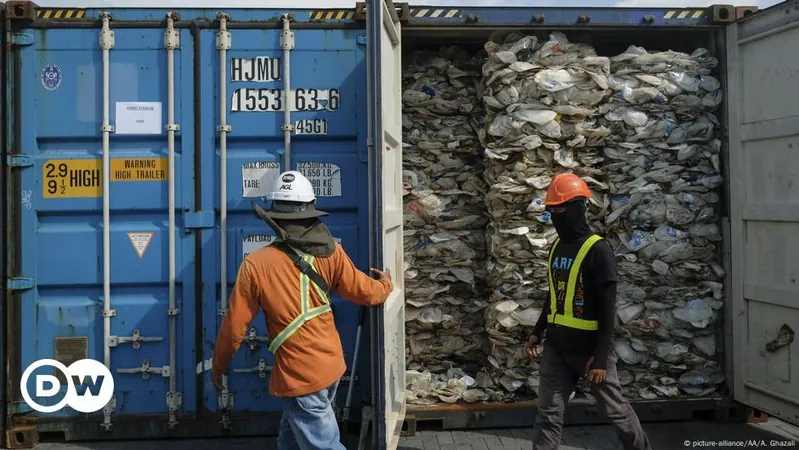
Malaysia Faces Uphill Battle Against European Plastic Waste Influx Amid Environmental Backlash
2024-11-04
Author: John Tan
Introduction
Malaysia has found itself in a challenging position as the world's second-largest importer of plastic waste from the European Union (EU), despite repeated promises from its government to prevent the country from becoming a dumping ground for foreign refuse.
Rising Import Numbers
Recent data from Eurostat reveals a staggering 35% increase in plastic waste imports from the EU in 2023 compared to the previous year, highlighting a troubling trend. Out of the 8.5 million tons of paper, plastic, and glass the EU exported this year, over 20% was directed towards Malaysia's landfills, alongside significant amounts received by other Southeast Asian nations such as Indonesia and Vietnam.
The Surge in Waste Exporting
The phenomenon of exporting waste has surged by 72% since 2004, with approximately 90% of Europe's waste still being processed domestically. Critics are questioning the ethical implications of this practice, especially as the EU aims to ban the export of plastic waste to non-OECD countries, including Malaysia, effective mid-2026. This ban is perceived as an acknowledgment of the environmental harm and ethical dilemmas that accompany these waste exports.
Hypocrisy in Green Initiatives
Jan Dell, founder of The Last Beach Cleanup, remarked that the EU's upcoming ban reveals "blatant hypocrisy" in its green initiatives, as it continues to escalate the volume of plastic waste exported to Asia rather than addressing the root causes of plastic usage or implementing more stringent measures at home.
Southeast Asia's Waste Imports
The UN reported that Southeast Asian countries collectively import over 100 million tons of various types of waste annually, valued at €47 billion between 2017 and 2021. This increase in imports can be traced back to China's 2018 ban on many recyclable materials, which forced countries like Malaysia to step into the breach as recipients of the discarded materials.
Government Stance on Waste Imports
Despite Malaysia's stated intentions to reduce waste imports, the government has stopped short of imposing a formal ban, citing economic motivations and the needs of the local recycling industry. However, as Greenpeace Malaysia’s Hema Sulakshana pointed out, much of the imported plastic is non-recyclable or contaminated, ending in landfills or incinerators rather than being effectively processed.
Debate Over Recycling Effectiveness
There is a stark division among environmentalists regarding the effectiveness of recycling practices within the controversial "circular economy," which champions the reuse of materials. While some advocates argue that recycling can significantly reduce waste and greenhouse gas emissions – potentially preventing 229 million metric tons of emissions in South and Southeast Asia by 2030 according to The Circulate Initiative – others insist that this approach alone falls short, as significant waste remains unaccounted for and continues to pollute the environment.
Current Recycling Rates
Malaysia’s 2020 recycling rate stood at a mere 30%, significantly lower than neighboring Singapore, and the country’s inadequate waste management infrastructure has contributed to rising levels of environmental degradation. Dangerous by-products from incineration, such as dioxins, pose risks to human health and biodiversity, evidenced by a toxic smoke incident at the Cam Ly garbage dump in Vietnam last year.
Loopholes in EU's Export Ban
Even as the EU gears up for its planned waste export ban in 2026, significant loopholes remain. Plastics may still be exported under certain conditions, and non-plastic materials like textiles will continue to flow to non-OECD nations. Environmentalists have raised alarms about the challenges facing Europe's textile recycling industry, which is burdened by an excess of used textiles and dwindling demand.
Call for Regulatory Reforms
To address these complex issues, both Malaysia and the EU need to fortify their regulatory frameworks to ensure that hazardous waste is not being mismanaged and to put an end to illegal waste trafficking, which currently accounts for an estimated 15% to 30% of waste shipments from the EU. There is a pressing need for enhanced enforcement on both sides, especially since illegal shipments may surge once new EU regulations come into force.
Conclusion
Greenpeace Malaysia's Sulakshana highlighted that Malaysia's National Solid Waste Management Department is not recognized as a “Competent Authority” under the Basel Convention, which governs international waste trade. Additionally, the Department of Environment lacks the authority to intervene once shipments arrive, indicating that regional cooperation and national policy reform are crucial for effectively managing waste imports and safeguarding Malaysia's environmental integrity.
Final Thoughts
As the world watches, Malaysia is at a crossroads, facing both an economic dilemma and an urgent environmental crisis – will it rise to the challenge or continue down the path of being the West's wastebasket?


 Brasil (PT)
Brasil (PT)
 Canada (EN)
Canada (EN)
 Chile (ES)
Chile (ES)
 España (ES)
España (ES)
 France (FR)
France (FR)
 Hong Kong (EN)
Hong Kong (EN)
 Italia (IT)
Italia (IT)
 日本 (JA)
日本 (JA)
 Magyarország (HU)
Magyarország (HU)
 Norge (NO)
Norge (NO)
 Polska (PL)
Polska (PL)
 Schweiz (DE)
Schweiz (DE)
 Singapore (EN)
Singapore (EN)
 Sverige (SV)
Sverige (SV)
 Suomi (FI)
Suomi (FI)
 Türkiye (TR)
Türkiye (TR)